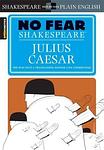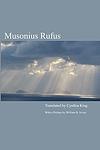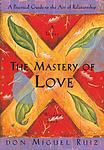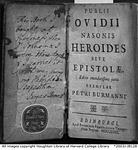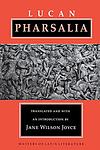The Greatest "Rome, Ancient Literature" Books of All Time
Click to learn how this list is calculated.
This list represents a comprehensive and trusted collection of the greatest books. Developed through a specialized algorithm, it brings together 300 'best of' book lists to form a definitive guide to the world's most acclaimed books. For those interested in how these books are chosen, additional details can be found on the rankings page.
Genres
The category of "Rome" in books refers to literature that is set in ancient Rome or focuses on the history, culture, and society of the Roman Empire. These books may include historical fiction, biographies, memoirs, and academic works that explore the political, social, and economic aspects of Rome. The genre may also encompass stories of gladiators, emperors, soldiers, and other figures from Roman mythology and history. Overall, the category of "Rome" offers readers a glimpse into one of the most influential civilizations in human history.
Ancient Literature refers to the body of written works produced during the earliest periods of human history, typically up until the fall of the Roman Empire in the 5th century AD. This category encompasses a diverse array of texts, including religious scriptures, epic poetry, philosophical treatises, historical accounts, and dramatic plays, originating from various civilizations such as the Sumerians, Egyptians, Greeks, Romans, Chinese, and Indians, among others. Notable works within this genre include the "Epic of Gilgamesh," Homer's "Iliad" and "Odyssey," the plays of Sophocles and Euripides, the philosophical writings of Plato and Aristotle, the "Mahabharata" and "Ramayana" from India, and the foundational texts of Confucianism and Taoism in China. Ancient literature provides invaluable insights into the thoughts, beliefs, and cultural practices of early societies, and continues to influence modern storytelling, philosophy, and ethics.
Countries
Date Range
Reading Statistics
Click the button below to see how many of these books you've read!
Download
If you're interested in downloading this list as a CSV file for use in a spreadsheet application, you can easily do so by clicking the button below. Please note that to ensure a manageable file size and faster download, the CSV will include details for only the first 500 books.
Download-
1. The Aeneid by Virgil
This epic poem tells the story of Aeneas, a Trojan who travels to Italy, where he becomes the ancestor of the Romans. It includes a series of prophecies about Rome's future and the deeds of heroic individuals, and is divided into two sections, the first illustrating the hero's journey and the second detailing the wars and battles that ensue as Aeneas attempts to establish a new home in Italy. The narrative is deeply imbued with themes of duty, fate, and divine intervention.
-
2. Metamorphoses by Ovid
"Metamorphoses" is a classical epic poem that narrates the history of the world from its creation to the deification of Julius Caesar within a loose mythico-historical framework. The narrative is filled with stories of transformation, focusing on myths and legends of the Greek and Roman world. The tales, which include the stories of Daedalus and Icarus, King Midas, and Pyramus and Thisbe, among others, are all linked by the common theme of transformation, often as a punishment or reward from the gods.
-
3. De Rerum Natura by Lucretius
"De Rerum Natura" is a long didactic poem written in the first century BC, which explores Epicurean philosophy and the nature of the universe. The text delves into topics such as the nature of the gods, the atomic structure of the universe, human sensation and thought, and the fear of death. The author argues that understanding the physical world can free humans from superstition and fear, leading to peace of mind and true happiness.
-
4. The Odes by Horace
"The Odes" is a collection of lyric poems by an ancient Roman poet. The poems cover a wide range of themes, including love, friendship, wine, nature, morality, and the human condition. The author's style is noted for its elegance, wit, and mastery of meter. The poems also reflect the social and political context of Rome during the author's lifetime, providing insight into the culture and values of the period.
-
5. Julius Caesar by William Shakespeare
This classic play dramatizes the political and personal machinations surrounding the assassination of a powerful leader. The narrative follows the conspirators' plot, their execution of the plan, and the resulting chaos and war. The themes of ambition, loyalty, and the struggle for power are explored through complex character interactions and memorable soliloquies. The play also examines the consequences of political violence and the unpredictable nature of history.
-
6. Letters from a Stoic by Seneca
"Letters from a Stoic" is a collection of moral epistles written by a renowned Stoic philosopher. The letters provide practical guidance on everything from dealing with adversity and the pursuit of wisdom to the folly of consumerism and the nature of friendship. The author's stoic philosophy encourages peace of mind through understanding and accepting the natural order of the universe, and his letters offer timeless wisdom and insights that are still relevant today.
-
7. Enneads by Plotinus
"Enneads" is a collection of 54 philosophical treatises by Plotinus, a prominent philosopher of the ancient world. The work is a cornerstone of Neoplatonism, a school of Hellenistic philosophy that sought to reconcile Greek philosophy with religious mysticism. The book covers a wide range of topics, including the nature of reality, the self, the universe, and the divine. The author argues for the existence of a transcendent One from which all existence emanates, and that the goal of human life is to strive for unity with this divine principle.
-
8. Titi Livi Ab urbe condita libri by Livy
This historical work offers a comprehensive narrative of the history of Rome, from its mythical origins to the reign of the Roman Emperor Augustus. The author chronicles the major political, military, and social events of the Roman Republic, including the founding of the city, the establishment of the Republic, the Punic Wars, and the rise of Julius Caesar. The book is a significant source of information about the early history of Rome and is often considered one of the most important works of Roman history.
-
9. Poetry by Quintus Lutatius Catulus
This book is a collection of ancient Roman poetry by a renowned statesman and poet. The poems reflect the author's experiences, thoughts, and feelings about life, love, politics, and society during the Roman Republic era. The author's eloquent and vivid writing style, combined with his astute observations and insights, make this book a valuable resource for understanding Roman culture and history.
-
10. Attis And Other Poems by Catullus
"Attis and Other Poems" is a collection of lyrical works that delve into themes of love, desire, and personal anguish. The poems are characterized by their emotional intensity and vivid imagery, often reflecting the poet's own tumultuous love affairs and inner turmoil. The titular poem, "Attis," stands out with its mythological narrative and exploration of themes such as identity and transformation. Throughout the collection, the poet's mastery of language and form is evident, as he skillfully weaves together personal experiences with broader reflections on human nature and the complexities of the human heart.
-
11. Natural History by Pliny (the Elder)
"Natural History" is an extensive work of literature that provides a comprehensive look at the knowledge of the natural world during the Roman era. The book is divided into 37 volumes, each focusing on different aspects such as geography, anthropology, zoology, botany, and mineralogy. The author's curiosity and fascination with the world are evident in his detailed observations and descriptions. The book also includes discussions on art, sculpture, and various other topics, providing a rich and detailed snapshot of the Roman understanding of the world.
-
12. Epistles by Horace
"Epistles" is a collection of poetic letters offering insights into the human condition, moral philosophy, and the art of living well. Written in the first century BCE, the work reflects the author's mature thoughts on various subjects, ranging from personal ethics to literary criticism. Through these letters, the poet shares his wisdom with friends and notable contemporaries, employing a conversational tone that blends humor, irony, and sincerity. The epistles serve as a guide to practical wisdom, emphasizing moderation, self-awareness, and the importance of living in harmony with nature and society.
-
13. Satires by Horace
"Satires" is a collection of poetic essays that delve into the follies and vices of Roman society during the first century BCE. Through a series of witty, critical, and often self-deprecating poems, the author explores themes such as greed, corruption, and social ambition, while advocating for a life of moderation and philosophical contentment. Employing a conversational tone and a keen eye for the absurd, the work satirizes the behaviors of both the elite and the common people, offering a timeless reflection on human nature and the pursuit of happiness.
-
14. On The Ends Of Good And Evil by Marcus Tullius Cicero
"On the Ends of Good and Evil" is a philosophical work that explores the ethical theories of Hellenistic schools, including Stoicism, Epicureanism, and the Peripatetic tradition. Through a series of dialogues, the text delves into the nature of happiness and the ultimate end of human action, examining what constitutes the highest good. The author critiques and compares the doctrines of these schools, ultimately defending the Stoic view that virtue is the sole basis of happiness and the ultimate goal in life, while also acknowledging valuable insights from other philosophical traditions.
-
15. Musonius Rufus by Musonius Rufus, Cynthia King
This book presents the teachings of Musonius Rufus, a prominent Stoic philosopher of the 1st century AD, whose ideas focus on the practical applications of Stoicism in daily life. Through a series of lectures and dialogues, Rufus emphasizes the importance of virtue as the sole path to happiness, advocating for simplicity in living, self-discipline, and equality between men and women in education and marriage. His accessible philosophy addresses how to live a good and moral life, covering topics from diet and exercise to the handling of emotions and the importance of philosophical study.
-
16. The Art Of Love by Ovid
The book in question is a didactic poem that explores the intricacies of love and seduction from the perspective of ancient Roman society. It offers a series of instructions and advice on how to attract and retain lovers, presented in a playful and often ironic tone. The work is divided into three books, with the first two primarily addressing men and teaching them how to find, win, and keep a woman's love, while the third book is directed at women, advising them on how to secure and captivate a man's affection. Throughout the text, the author interweaves mythological references and personal anecdotes, creating a rich tapestry of amorous strategies that reflect the social and moral attitudes towards love and relationships of his time.
-
17. Heroides by Ovid
The book is a collection of fifteen epistolary poems presented as though written by various mythological heroines of Greek and Roman lore to their absent lovers. These letters express the women's emotions as they lament their separation, recount their memories, and plead for their lovers' return. The work explores themes of love, betrayal, and the female perspective within the context of classical myths, offering a unique insight into the emotional lives of characters such as Penelope, Dido, and Medea, who are traditionally depicted through the eyes of male heroes and writers.
-
18. Satires by Juvenal
"Satires" is a collection of poetic essays from ancient Rome that offer a scathing critique of the social and political landscape of the time. The work delves into the corruption, decadence, and moral decay of Roman society, using biting wit and a satirical tone to expose the vices and follies of its citizens and leaders. The author employs a range of literary devices, from irony to hyperbole, to lambast the greed, hypocrisy, and depravity he perceives, while also reflecting on human nature and the challenges of living a virtuous life amidst widespread societal failings. The text is not only a commentary on the specific historical context but has also been interpreted as a timeless exploration of the human condition.
-
19. On The Gods by Marcus Tullius Cicero
The book is a philosophical treatise that explores ancient theological concepts and the nature of the gods, presenting a critical examination of various religious beliefs and practices of the time. The author, a Roman statesman and scholar, engages in a series of dialogues that delve into the existence and attributes of the divine, contrasting the Epicurean view of detached gods with the Stoic belief in a providential order. Through rigorous argumentation and eloquent rhetoric, the work seeks to understand the role of the gods in human life and the universe, while also reflecting on the implications of piety, fate, and the pursuit of happiness within the context of Roman religion and philosophy.
-
20. Mark Antony by Robert Garnier
The book in question is a classic French Renaissance tragedy that delves into the complex and tumultuous life of a renowned Roman general and politician. Set against the backdrop of the Roman Empire's decline, the narrative explores themes of love, power, betrayal, and the tragic consequences of human flaws. The protagonist's story is one of a passionate and ill-fated love affair with a foreign queen, political strife, and the ultimate downfall of a once-great leader. Through poetic language and dramatic scenes, the play examines the intricate interplay between personal desires and the harsh realities of political life, leading to a catastrophic end that reflects on the nature of fate and the inescapable flaws of humanity.
-
21. Roman Elegies by Johann Wolfgang von Goethe
"Roman Elegies" is a collection of twenty-four poems that celebrate the classical heritage of ancient Rome while reflecting on contemporary European society. The poems are notable for their eroticism and the personal nature of their content, as they delve into the author's own experiences and emotions during his time in Italy. Through a blend of personal reflection and homage to the ancient world, the work explores themes of love, art, and the human experience, blending the sensual with the intellectual. The elegies are a testament to the author's passion for classical culture and his mastery of poetic form, as well as his ability to infuse his verse with both the depth of his scholarly interests and the intensity of his personal feelings.
-
22. Epigrams by Martial
The book is a classic collection of Latin poetry, renowned for its wit, sharp observations, and often biting satirical content. Comprising numerous short, pithy poems, the work captures the essence of Roman society, its vices, virtues, and daily life, through the lens of the poet's keen eye. The poet employs a range of literary devices, from irony to hyperbole, to craft epigrams that are at once humorous, poignant, and reflective of the human condition, making the collection a timeless exploration of social mores and personal relationships in ancient Rome.
-
23. Pharsalia by Lucan
"Pharsalia," also known as "The Civil War," is an epic poem that delves into the intense and tumultuous period of the Roman Republic's downfall, focusing on the conflict between Julius Caesar and Pompey the Great. The narrative, rich in rhetorical and dramatic elements, presents a grim and philosophical reflection on the nature of power, the moral decay of Rome, and the catastrophic consequences of civil strife. Through its vivid and often gruesome depictions of battles, political intrigue, and the personal ambitions that drive men to treachery and violence, the poem serves as a cautionary tale about the fragility of political systems and the human cost of war.
Reading Statistics
Click the button below to see how many of these books you've read!
Download
If you're interested in downloading this list as a CSV file for use in a spreadsheet application, you can easily do so by clicking the button below. Please note that to ensure a manageable file size and faster download, the CSV will include details for only the first 500 books.
Download



